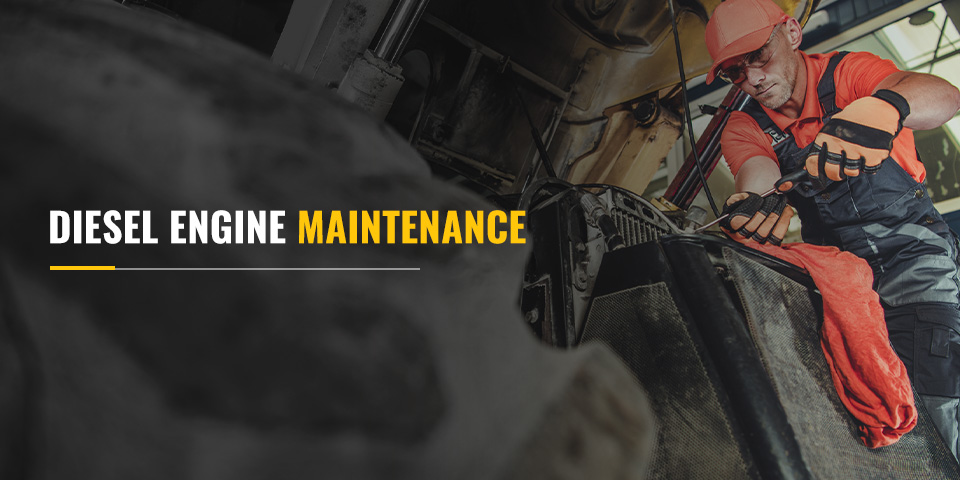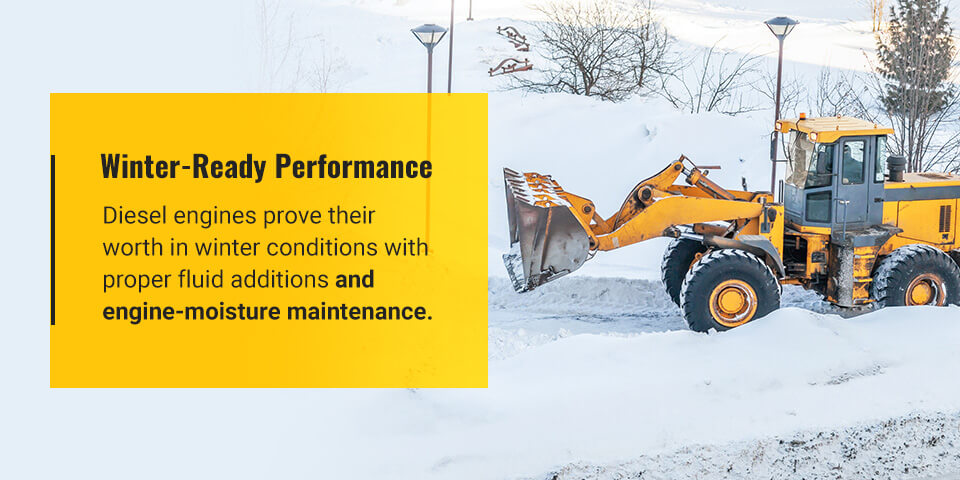
Your Complete Diesel Engine Maintenance Guide
They’re the workhorses of the engine world. They’re as tough as they are tenacious, running machines big and small. They’re durable, economical and — most importantly — reliable.
They’re diesel engines — and when you care for them properly, they power your trucks, RVs, boats and heavy equipment through the years for a sturdy and long service life.
We’ve got your complete guide to modern diesel engine maintenance tips below. From routine care and protecting parts to winterizing your diesel engine and avoiding engine failure, the most common diesel engine questions and concerns are all in one spot, ensuring the longest possible partnership between man and machine.
Why Diesel Engine Maintenance Is So Important
It’s not a complicated equation- taking care of your diesel engine means it will take care of you, time and time again.
Through years of usage and inevitable wear and tear, maintaining a clean and robust engine is not merely responsible ownership — it saves you time and money in the long run. Small steps every season to assess your engine and fix problems will translate into big rewards.
Proper diesel engine maintenance entails steps you’re likely already familiar with, broken down into four main maintenance categories.
- Cleaning: Preserving a clean engine is step one to the hardiness and reliability of any truck, bus, RV, boat or diesel-powered machinery.
- Routine servicing: Don’t neglect annual or biannual oil and filter changes and fluid analysis, on top of maintaining other critical diesel-specific parts.
- Winterizing: Winterizing your diesel engine is imperative for its lifespan — as well as the overall health of your vehicle and equipment.
- Quality replacement parts: Skimp elsewhere in life, not on diesel engine parts — which are far more likely to rust, corrode and cause widespread mechanical damage.
Advantages of Modern Diesel Engines
As modern diesel engines continue to evolve, the advantages of diesel engines only become more pronounced, promising a future of efficient and sustainable transportation and power generation.
Fuel Economy
In 2018, diesel engines achieved an unprecedented level of fuel economy. Diesel, renowned for its exceptional energy density, is one of today’s most efficient fuel options. Its superior mileage and vehicle fuel economy are undeniable.
Diesel engines operate with 20%-35% higher fuel economy than gasoline engines. This efficiency stems from the direct conversion of heat into engine energy, eliminating the need for complex mechanical conversions and thermal systems required by gasoline engines.
Fuel Efficiency
Building on the fuel economy advantage, modern diesel engines boast fuel efficiency, making them an economical choice. Commercial and industrial trucks and vehicles often integrate high-efficiency rail-injection systems, significantly contributing to diesel’s maximized miles per gallon.
While diesel prices may have risen in recent years, this mechanical prowess levels the playing field, offsetting the cost through increased fuel efficiency and mileage. As a result, diesel engines prove to be more cost-effective over their operational life spans.
Engine Life
Diesel engines’ direct energy conversion capabilities empower them to run longer, stronger, and more robustly. These engines are engineered to handle rigid compressions with smoother performance, effectively managing overall engine wear and tear.
The durability of diesel machines ensures their reliability and extended life span, leading to better resale or trade-in values for vehicle owners. Investing in diesel engines becomes a wise and enduring choice.
Reduced Noise and Pollutants
Advancements in technology and stricter emission policies have revolutionized the sustainability of diesel engines while promoting gentler operation. Modern diesel engines have catalytic converters, enhanced multilayered filters, and innovative mechanical features that substantially reduce emissions.
Furthermore, the evolution of diesel into biodiesel forms has reduced sulfur amounts and other noxious discharges, making them environmentally friendly and more appealing to eco-conscious consumers.
Winter-Ready Performance
Diesel engines prove their worth in winter conditions with proper fluid additions and engine-moisture maintenance. Their rugged power generation capabilities make them primed for challenging weather scenarios.
Additionally, the absence of distributors and spark plugs in diesel engines translates to virtually nonexistent ignition tune-ups, saving both time and maintenance costs.
Bad Habits to Avoid for Diesel Engines
The make and model of your diesel engine will determine its specific required upkeep. For trucks and similar vehicles, consider the age of your engine and its subsequent diesel-related concerns.
For old and used diesel engines:
- Not emptying the water separator: Aside from changing air, oil and fuel filters regularly, owners of older diesel engine models must manually open and empty the water separator periodically to avoid problematic leaks or moisture residue. Old engines do not carry automatic water releases that drain excess water from their systems.
- Not letting engines warm up: You need a proper engine operating temperature above 40 degrees Fahrenheit before running diesel-fueled vehicles. Otherwise, you risk chunky, jelly-like fuel.
- Buying cheap replacement parts: Inexpensive or cheap parts are that way for a reason. Often they’re mismatched, secondhand deals at odds with your diesel engine make and model. It’s best to avoid these for your system’s health.
For new diesel engines:
- Forgoing oil additives: Diesel engines create a lot of heat and a lot of water residue. Opt for fuel additives that enhance engine lubrication as well as your vehicle’s water separator system, adding them straight into your fuel source for optimal running.
- Overlooking fuel gelling: Even when fueling your vehicle with a winter blend, prime diesel engines with winterization additives to prevent fuel gelling, which will clog and damage engine filters and reduce fuel efficiency.
- Forgetting about air leaks: Contaminants can easily build up in diesel engines’ layered filter and fuel-injection systems. Many are aware of problems associated with sludge and water droplets to sulfur residue on diesel engines, yet overlook air leaks, which are likely to happen between filter inlets and engine lift pumps. If you fail to address them, these air leaks will compromise your engine’s fuel lines and connections and potentially shut down the entire system.
For both used and new diesel engines:
- Neglecting coolant: Coolant turns acidic over time. Overly acidic coolant has the opposite effect on your engine than intended, rotting and damaging an engine’s cooling system. Use annual servicing to check coolant levels and replace, if needed.
- Mixing coolants: Mixing coolant formulas can cause as much damage as neglecting the liquid. By mixing coolants, you run the risk of adverse chemical reactions that can create a stew in your engine, clogging and damaging the entire system.
- Too many short trips: Using your diesel-engine vehicle in too many short bursts causes startup damage. There are a few ways to address this. Consider installing pre-lube systems that release oil to vulnerable engine parts before ignition, or through additions like turbo timers, which monitor engine temperatures and keep motors running for an appropriate shut-down window.
Winterizing Diesel Engines
Diesel fuel holds wax-like substances called paraffins that solidify when cold and can plug or choke your fuel system. Likewise, moisture and ice present another set of winterization problems for your diesel engine you must address beforehand.
Typical diesel engine maintenance tasks start well before winter strikes. While you should always allow your engine to warm up properly regardless of the time of year, during winter, these additional engine care steps take precedence.
1. Prepare the Fuel
Prep your diesel fuel from problematic winter gelling with a few tactics.
Add liquid treatments such as de-icers, paraffin anti-setting fluids and cold-flow improvers that will fortify diesel fuel and maintain peak engine performance.
You can also consider using diesel fuels that are specially blended for extremely low temperatures. These specialty blends will often automatically include the liquid additives named above, making them a one-stop solution for winter fuel prep.
2. Check Water Separators and Swap Filters
Burning diesel creates water byproducts that are especially damaging during winter months. Fuel pumps and injectors are particularly susceptible to condescension — or worse, water freezing into ice inside fuel storage tanks and filtration lines.
Keep hydraulic oil and fuel tanks full, and be sure to check your water separator conditions and moisture filters at the beginning of winter. Replace old, corroded or moldy filters with new ones as needed.
3. Ready the Battery
Winter is particularly hard on vehicle batteries. Check your battery terminals and tighten all connections before cold weather sets in, or completely replace batteries if they’re at the tail end of the recommended 48- to 72-month lifespan.
If storing a diesel-engine machine for the winter, such as a boat, disconnect any battery ground cables and assess other potential battery drains before shutting them away.
4. Inspect the Cooling System
Next, review your engine’s cooling system. Winter’s conditions cause intense temperature fluctuation in and around diesel engines, which means the cooling system will be under repeated stress.
Check coolant-fluid levels for proper freezing points. Add liquid treatments to coolant if needed, but never mix coolant types or stray from your machine’s recommended varieties. Last, look for damaged, cracked or loose cooling-system parts, such as in the radiator, hoses or hose clamps.
5. Analyze Belts and Hoses
Last but not least, pay attention to the condition of engine belts and hoses. In winter, these parts are under increased strain — particularly hoses, as they transport smooth, non-gelled fluids throughout the engine.
Turn off your vehicle to begin a belt and hose assessment. Look for cracks and bulges in rubber, as well as torn strands and too-rigid or too-flexible lines. Hoses especially need to be soft and flexible in winter, returning to their natural shape after you’ve pressed them to check the texture.
Also, be on the lookout for leaks or liquid seepage, which you can fix with clamps or even a new hose if the damage is severe. Consult with local diesel engine experts with any questions on winterizing engine parts, and consider adding winterization into annual servicing packages.
Signs Your Diesel Engine Needs Immediate Service
Though it’s not a scenario any of us likes to consider, diesel engine failure can strike in many places, for many reasons. If you experience the following problems while operating your diesel-engine truck, bus, boat or machinery, your engine could be in need of immediate servicing.
1. Hard Starts
Difficult or stalled engine startups that occur repeatedly are a telltale sign something is remiss with your system. Whether the hard start is due to cold weather or something more severe, an expert should review idle clatter and clunky starting ignition. They can diagnose the engine’s startup pain point, from malfunctioning glow plugs to injector timing problems to lubrication concerns throughout the engine’s system.
2. Black, White or Blue Exhaust
Troubleshooting diesel engines by exhaust color often takes an expert eye, as each color signals different engine concerns. In the least severe cases, various-colored exhaust can mean there is an insufficient fuel amount left in your tanks. Worst-case scenario, it signals faulty injectors, pumps or even turbo problems alongside other serious internal engine concerns.
3. Broken Fuel-Injection System
Their advanced fuel-injector systems are a significant reason diesel engines come with the durability and fuel efficiency they do. However, it’s also why mechanical expertise is necessary in the event of broken or damaged fuel injectors.
These parts naturally require servicing between 100,000 to 120,000 miles of usage. They can see damage in a few forms — everything from snagged lines and imbalanced return or backflow leakage to general negligence.
4. Lack of Power or Acceleration
Over time, truck owners and vehicle operators often experience diminished power and acceleratory responses with their diesel engines. These, too, can stem from multiple system ills, such as worn-out fuel filters, clogged or dirty catalytic converters or even engine temperature irregularities.
A professional will likely assess the temperature fluctuations of your diminished diesel engine and use its readings to determine the source of the lack of power. A broken transmission causes the most extreme acceleration damage, in which case quality installation and direction are necessary.
Preventing Catastrophic Engine Failure
While contemporary diesel engines are renowned for their durability and reliability, they should never be taken for granted. Neglecting even the most basic engine care routines can lead to dire consequences. To ensure you get the most from your diesel machine and safeguard your hard-earned time and money, follow these essential diesel engine maintenance tips for a long service life.
1. Oil and Filter Changes
Clogged or dirty filters can hinder performance, while neglecting oil changes can lead to severe interior damage. Diesel engines operate under higher heat conditions than gasoline engines, necessitating frequent oil changes and quality assessments. Liquid additives during and after winter are also recommended to maintain peak performance.
2. Water Control
The high heat and direct energy conversion in diesel engines make them susceptible to moisture damage. Built-in parts and filters provide some protection, but checking and maintaining these components is crucial to prevent engine failure.
Ensure that water is kept out of your fuel tank, and be vigilant for potential leaks that could lead to moisture buildup. Regularly inspect fuel caps to prevent excess moisture from entering inappropriate areas of the engine. Also, routinely swapping air filters is vital to prevent the mixing of air and water vapors. Remember to maintain your automatic water separator or manually empty an older, non-automatic unit.
3. Fuel Injection Maintenance
Fuel injection problems typically arise from compromised injector parts, the injector’s structure, or tainted fuel passing through the injector. Weather, operating conditions, and engine age can contribute to fuel injection maintenance requirements, and it’s best to have a professional assess and address these issues.
4. Regular Servicing
Regular servicing is the most effective way to keep overall diesel engine maintenance costs low. Enlist the expertise of a certified technician who will conduct comprehensive tests on your diesel engine. Furthermore, they can perform vital cleaning, oil, and filter changes, sparing you from potential headaches and extending the engine’s life span.
Recommended Schedule for Diesel Engine Maintenance
Both preventive and extended maintenance packages are available throughout Alabama for your diesel engine maintenance. We recommend the following timelines for best care.
Oil Changes: Every 5,000 Miles
Diesel-engined vehicles should receive oil changes roughly every 5,000 miles. More conservative recommendations exist for high-use or heavy-operating trucks or machinery, such as those hard-driving and performing repetitive tows. In these cases, look to change oil every 3,000 miles.
Changing Fuel Filters: Every 10,000 to 20,000 Miles
Fuel filters need replacing between 10,000 and 20,000 miles of use. Take care to replace all fuel filters at once to keep the system synchronized and efficient. Older diesel engines may need replacement sooner, while newer diesel engines might have two or more engine filters that will last closer to the 15,000 to 20,000 benchmarks.
Replacing Air Filters: As Needed
Inspect air filters biannually, especially before and after the harshest months of winter. You can check air filters at home and then bring them in for second opinions and servicing. Monitor filters closely at all times, plus clean them as needed for peak engine performance.
Top Diesel Engine Maintenance in Alabama
When it comes to expert diesel-engine knowledge, insights and service, few do what Thompson Tractor ® does.
We are the leader in Alabama and Northwest f for diesel engine service, though we hardly stop there. Our regular and preventive maintenance schedules ensure you get the most from your diesel engine use after use, year after year — plus, they equip you with confidence and engine savvy along the road.
Our trained technicians and diesel-engine maintenance professionals are experts at diesel rebuilds for Cat®-engine units and other large diesel engines. We wish to be your one-stop shop in Alabama and Northwest Florida for all diesel-related questions and concerns.
Contact Thompson Tractor to learn about our diesel engine maintenance services today.






